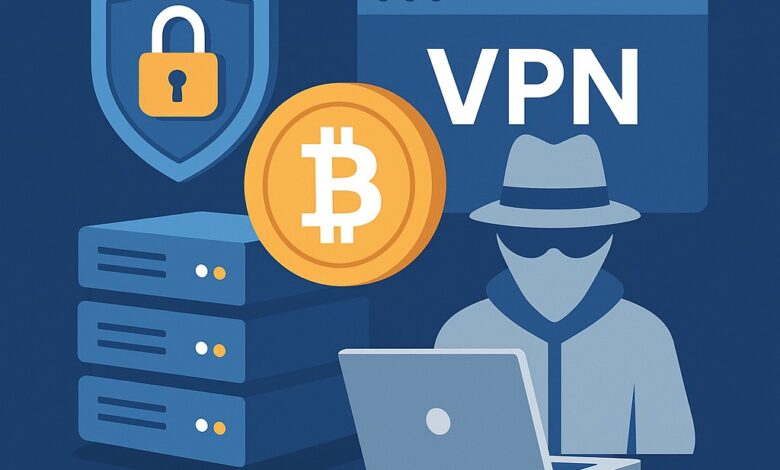Why Crypto Hosting Is the Future of Online Privacy and Payments

Introduction
In today’s digital world, privacy and secure payments are no longer optional—they’re essential. From increasing regulatory scrutiny to frequent data breaches and rising censorship, individuals and organizations are seeking new ways to protect their data and transactions. Crypto Hosting emerges as one of those ways, offering a combination of anonymity, decentralization, and financial sovereignty.
This post explores why Crypto Hosting is not just a trend but a crucial infrastructure component for online privacy and payments. We’ll define what it means, examine current issues in privacy and payments, see how Crypto Hosting responds to them, look at challenges, and project where this is headed.
The Current State of Online Privacy & Payment Systems
To understand why Crypto Hosting is becoming more important, it helps to see what problems exist today in privacy and payment systems.
- Data Collection & Surveillance
- Many web services collect user data—IP addresses, browser fingerprints, geolocation, login activity—and often retain logs for long periods.
- Governments, advertisers, and other entities may access or demand this data.
- Payment System Vulnerabilities & Control
- Traditional payments—credit cards, bank wires, online payment processors—link identity to transactions.
- Financial intermediaries impose fees, delays, and often require identity verification (KYC).
- Cross-border payments can be restricted, expensive, or censored.
- Censorship, Takedowns & Legal Exposure
- Websites or platforms may get taken down due to legal pressure, intellectual-property claims, or political pressure.
- Hosting providers operating under strict jurisdictional laws may be compelled to remove content or share data.
- Growing Awareness & Regulatory Reaction
- Users are increasingly concerned about privacy and demand stronger safeguards.
- Meanwhile, regulators are pushing for transparency, but also often for controlling misuse—making legitimate privacy more challenging.
- Emerging Technologies & Citizen Demands
- Self-sovereign identity, privacy coins (like Monero), zero-knowledge proofs, and decentralized systems are gaining traction.
- People want more control over their digital footprint and payments.
What Is Crypto Hosting?
Crypto Hosting refers to web hosting services that prioritize privacy, allow payments via cryptocurrency, operate under favorable or offshore jurisdictions, and often offer features like minimal or no KYC, strong encryption, anonymity, bulletproof hosting, and resistance to censorship.
Key components of Crypto Hosting include:
- Crypto payments & billing: ability to pay using Bitcoin, Ethereum, stablecoins, privacy coins.
- Anonymity / pseudonymity: minimal identity verification, use of pseudonyms, hidden/anonymous domain registration.
- Offshore / privacy-friendly jurisdictions: servers located where laws are favorable for privacy or minimal oversight.
- Content policy resilience: providers may ignore DMCA or similar takedown requests.
- Strong security measures: encrypted connections (SSL/TLS), encrypted storage, DDoS mitigation, secure backups.
Providers like BlackOutHost illustrate many of these features: accepting crypto payments, offering bulletproof or DMCA-ignored hosting, minimal identity requirements, offshore infrastructure.
How Crypto Hosting Addresses the Problems
Now let’s connect the dots: how Crypto Hosting can be a solution to the problems in privacy and payment systems identified earlier.
| Problem | How Crypto Hosting Helps |
| Data collection / surveillance | By minimizing personal identity data, by not requiring KYC, by accepting payments that do not expose identity, by storing minimal logs. |
| Payment control & restrictions | Crypto payments are borderless, less tied to centralized authorities, often anonymous/pseudonymous, fewer restrictions. |
| Censorship & takedowns | Offshore or bulletproof hosts may resist content removal demands and legal pressures. |
| Privacy concerns in mainstream hosting | Mainstream hosting often retains logs, has direct exposure to laws; crypto hosting tends to isolate from that. |
| Demand for financial sovereignty | Crypto gives more control over one’s own funds; hosting with crypto payments avoids reliance on banks or payment processors. |
These responses make Crypto Hosting appealing not only to fringe or high-risk users (journalists, activists, whistleblowers) but also to businesses, developers, and everyday users who simply value their privacy and want freedom in payments.
Key Features to Look for in Crypto Hosting
If you believe in the promise of Crypto Hosting, not all hosts are created equal. To realize its benefits, consider these features:
- Payment flexibility
- Support for multiple cryptocurrencies.
- Privacy coins (e.g. Monero) or stablecoins.
- Possibly mixed/payment coins that reduce traceability.
- Minimal KYC or identity proof
- Requires only essential information.
- Possibly allows pseudonymous sign-ups.
- Jurisdiction & legal posture
- Hosts with servers in countries with strong privacy laws or weak enforcement of restrictive laws.
- Transparent policy about takedown requests and how they handle legal pressure.
- Security & infrastructure
- DDoS Protection.
- TLS/SSL encryption.
- Encrypted storage and backups.
- Frequent software updates, hardened systems.
- Anonymity in ancillary services
- Private WHOIS / domain privacy.
- Anonymous payment addresses.
- Support for VPN, Tor, or other anonymity tools.
- Performance & reliability
- Fast network, good bandwidth, low latency.
- Server uptime guarantees, redundancy.
- Transparent terms of service
- What content is allowed or disallowed.
- What logs are kept and for how long.
- How the provider responds (or refuses to respond) to takedown requests.
Use Cases: Who Needs Crypto Hosting?
Crypto Hosting isn’t just for “edgy” or “dark web” activity. Several categories benefit strongly.
- Journalists, whistleblowers, activists who need to publish sensitive information without exposing their identity.
- Developers or businesses who want to avoid centralized financial intermediaries and reduce vulnerability to censorship.
- Privacy-focused content creators (forums, blogs, media) wanting resistance to removal or external pressure.
- Decentralized application (dApp) projects and Web3 platforms that align with decentralized payments and infrastructure.
- E-commerce platforms that accept crypto payments and wish to avoid payment processing hurdles.
Real-World Example: BlackOutHost
To illustrate how Crypto Hosting works in practice, it helps to look at a provider that embodies many of its features — BlackOutHost.
- Crypto Payment Support: Accepts many cryptocurrencies, enabling users to pay without linking bank information.
- Anonymity / No KYC: Emphasizes minimal identity requirements.
- Bulletproof Hosting & DMCA-Ignored: Positions itself as a host that resists takedown requests.
- Offshore Infrastructure: Servers located in jurisdictions with more permissive or privacy-friendly laws.
- Security & Resilience: DDoS protection, backups, infrastructure built for uptime.
These features make BlackOutHost a fitting case study in what “future-ready Crypto Hosting” looks like.
Challenges and Risks of Crypto Hosting
While the future looks promising, Crypto Hosting has downsides and risks. These must be acknowledged.
- Legal & Regulatory Risk
- Even offshore jurisdictions may have agreements or laws that force providers to comply under pressure.
- Content that is illegal in major jurisdictions (hateful content, certain copyrighted material, illicit trade) can lead to service disruption, seizures, legal risk.
- Reputation & Trust Issues
- Because some users may abuse anonymous hosting, IP addresses or providers may become blacklisted or blocked by ISPs, search engines, or payment processors.
- Associating with a bulletproof host may carry reputation risk for a business or individual.
- Technical & Performance Trade-offs
- Offshore locations may increase latency for users in certain regions.
- Infrastructure may be less reliable in some jurisdictions.
- Financial Volatility & Payment Complications
- Crypto prices fluctuate. Paying in crypto means you might overpay if the coin’s value drops.
- Transaction times and fees can vary (for example, Bitcoin congestion, gas fees on Ethereum).
- Security & Operational Risk
- Even if hosting is anonymous, poor configuration, weak passwords, or outdated software can expose sites.
- Human error in backups or server management.
Why the Trend Toward Crypto Hosting Is Accelerating
Several macro-trends suggest that Crypto Hosting isn’t just a niche but increasingly central to how the internet evolves.
- Growing Public Concern Around Privacy
Surveys and consumer expectations show that people care more than ever about privacy. Features like end-to-end encryption, anonymous identity, and pseudonymous payments are becoming selling points.
- Stronger Regulatory Pressure
Regulators in many regions demand more data from companies, push for transparency, or impose license requirements. In reaction, many users seek ways to preserve privacy, and providers aim to offer safe haven alternatives.
iii. Maturation of Cryptocurrency & Web3 Infrastructure
- Payments in crypto are more user-friendly (wallets, exchanges, stablecoins).
- Tools for privacy (mixers, privacy coins, zero-knowledge techniques) are improving.
- Decentralized identity systems and decentralized storage are gaining adoption.
- Increase in Censorship & Content Control
In many countries, internet censorship or content regulation is increasing. Crypto Hosting offers ways to resist or circumvent that, making content more resilient.
- Demand for Financial Sovereignty & Decentralization
For many, centralized financial and hosting services are seen as single points of control or failure. Crypto Hosting aligns with ideals of decentralization and control by individuals.
Emerging Technologies that Amplify Crypto Hosting
Crypto Hosting doesn’t act alone. Other technologies reinforce its strengths and widen its possibilities.
- Privacy Coins & Zero-Knowledge Proofs: These allow payments that are hard to trace, bolstering payment anonymity.
- Decentralized Storage (e.g. IPFS, Filecoin, Arweave): Reduce reliance on centralized data centers; potential for fully distributed hosting.
- Edge Hosting & Content Delivery Networks (CDNs): Distribute content close to users while maintaining cryptographic security.
- Decentralized Identity (Self-Sovereign Identity): Users control their identity, reducing need for centralized identity checks.
- Anonymity Networks (Tor, mixes, VPNs): To hide traffic metadata and protect communications.
These make a Crypto Hosting setup stronger, more resilient and more private.
What to Expect in the Future of Crypto Hosting
Here are projections and trends likely to shape Crypto Hosting in the next 5-10 years.
- More Mainstream Adoption
- Businesses selling “privacy-focused hosting” will be more common; even established providers may adopt some crypto hosting features.
- Content platforms, blogs, e-commerce may standardize accept crypto payment and offer anonymous hosting add-ons.
- Regulatory Evolution
- Governments may try to regulate or block anonymous hosting; jurisdictions will compete to offer privacy hospitable regulations.
- Crypto regulation will tighten, but also become clearer, which may help some providers operate in legal safe-zones.
- Better Technology for Privacy & Speed
- Advances in encryption, quantum-safe crypto, improvements in zero-knowledge proofs.
- More decentralized infrastructure for hosting and storage.
- More efficient architectures, lower latency environments.
- Integration with Web3 Ecosystem
- Hosting providers may integrate with blockchain domain names, identity systems, decentralized storage networks.
- Payment models might evolve: pay-as-you-go in crypto, micropayments, or token-based access.
- User Demand for Transparency & Ethics
- Users will demand not just “crypto payments” but also ethical policies: how data is handled, what content is allowed, transparency in how providers handle legal/takedown requests.
How to Use Crypto Hosting Responsibly & Effectively
To get the most from Crypto Hosting and to avoid pitfalls:
- Use good operational security: VPN or Tor to access control panels, strong passwords, SSH keys.
- Choose trustworthy providers: Examine reviews, check uptime, check whether privacy claims are credible.
- Monitor regulatory risk: If your audience or service operates in restrictive jurisdictions, be aware of legal exposure.
- Diversify backups and redundancy: Store backups separately, possibly in encrypted form.
- Stay current with crypto payment best practices: use privacy coins if needed, avoid re-using addresses, consider transaction fees/timing.
- Make domain anonymity a priority: WHOIS privacy, or domain registrations via privacy-focused registrars.
Potential Objections & Why They May Not Hold
Here are common criticisms of Crypto Hosting and responses:
| Objection | Response / Mitigation |
| Risk of illegal content & misuse | Responsible providers have terms of service. Users who host illegal content are still liable. The majority of users use these services for legitimate purposes. |
| Performance & latency issues | Strategic data center placement, use of CDNs, edge networks can mitigate these. Providers are improving. |
| Volatility of cryptocurrency payment values | Options include stablecoins, prepaying, or having buffer/hedging strategies. |
| Regulatory crackdown | Legal risk never zero, but jurisdictions differing in privacy laws provide options. Transparency of providers is critical. |
Case Studies & Comparisons
To further illustrate how Crypto Hosting is outpacing traditional hosting in privacy & payments, let’s compare in some scenarios.
| Scenario | Traditional Hosting | Crypto Hosting |
| Accepting payments globally | Needs PCI compliance, bank and credit card processing, currency conversion, high fees. | Use of crypto allows global payments, fewer intermediaries, often lower fees. |
| Hosting politically sensitive content | Subject to local laws, take down orders, possible server seizure. | Offshore or bulletproof hosting may resist takedowns; more legal complexity for requesting agencies. |
| Maintaining anonymity | Tied to identity through KYC, payment methods. | Anonymity/pseudonymity, payment via crypto, private domains. |
| Scalability & features | Well-resourced providers, but sometimes rigid policies. | Crypto Hosting providers increasingly offer VPS, dedicated servers, scalable infrastructure. |
Real world examples (like BlackOutHost) show that providers are combining crypto payments, minimal identity verification, and bulletproof hosting to serve users who need both privacy and ease of payments.
The Role of BlackOutHost in the Crypto Hosting Landscape
BlackOutHost offers a practical exemplar of how Crypto Hosting is already delivering future-oriented solutions:
- It supports many cryptocurrencies, giving users flexibility and privacy in payment.
- It emphasizes bulletproof hosting (DMCA-ignored), minimal identity checks.
- Its infrastructure is built for resilience: DDoS protection, multiple server locations, offshore geopolitical neutrality.
- It appeals to users who want both content freedom and financial privacy.
By doing so, BlackOutHost helps define what the future of Crypto Hosting may look like: secure, fast, privacy-first, payment sovereign.
Predictions: What Will Crypto Hosting Look Like in 2030?
Looking out toward 2030, here are educated guesses:
- Hybrid hosting models: A mix of decentralized and centralized infrastructure; part of service delivered via decentralized storage with fallback to centralized systems.
- Crypto-native domain & identity systems: Domains registered on blockchain, identity verification anchored in decentralized IDs.
- Full payment stack integration: Not just paying with crypto, but receiving revenues, subscriptions, microtransactions using crypto tokens or smart contracts.
- Privacy by default: Encryption, minimal logs, anonymous registrations will be standard, even among mainstream hosts.
- Regulatory norms shaped by privacy ethics: Laws that protect privacy while trying to reduce abuse; providers will build compliance and transparency tools.
Conclusion
Crypto Hosting is more than a niche or fringe option. It is rapidly becoming a necessity for any individual, organization, or business that values privacy, autonomy, and freedom in online payments. The convergence of rising privacy concerns, regulatory pressures, advancing crypto infrastructure, and user demand creates a fertile environment for Crypto Hosting to become standard rather than exceptional.
By understanding what Crypto Hosting means, choosing providers wisely (such as BlackOutHost and others), and deploying strong operational practices, you can position yourself for the digital future—one where privacy is built in, payments are freer, and control over your online presence is yours.




